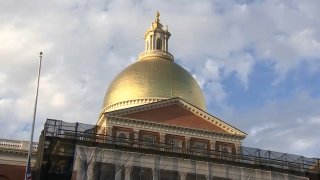
State officials collected less in taxes than they expected for the sixth straight month in December, putting the year-to-date haul three-quarters of a billion dollars below projections as budget-writers face a growing thicket of challenges.
The Department of Revenue announced Thursday that it brought in $3.776 billion in December, which is not only $138 million or 3.5 percent below the monthly benchmark estimate but also $82 million or 2.1 percent less than what the state collected in December 2022.
WATCH ANYTIME FOR FREE
Stream NBC10 Boston news for free, 24/7, wherever you are. |
Halfway through fiscal year 2024, the state has now brought in $769 million or 4.1 percent less than the projections used to craft an annual budget featuring steep spending increases. Tax revenue has increased a hair compared to the same point one year ago -- up $60 million or 0.3 percent -- but the limited revenue growth is not lined up with expectations or Beacon Hill's appetite for spending.
"December collections decreased in non-withheld income tax, sales and use tax, corporate and business tax, and 'all other' tax in comparison to December 2022," said Revenue Commissioner Geoffrey Snyder. "These decreases were partially offset by an increase in income tax withholding. The decrease in non-withheld income tax was driven primarily by lower income tax estimated and return payments and an unfavorable increase in income tax refunds. The decrease in sales and use tax was mainly due to typical timing factors in collections. The decrease in 'all other' tax is mostly attributable to a decrease in estate tax, a category that tends to fluctuate."
Get updates on what's happening in Boston to your inbox. Sign up for our News Headlines newsletter.
Beacon Hill's budget experts are now 0-for-6 at predicting monthly tax revenues this fiscal year, and the steady sluggishness combined with looming costs is cranking up the heat on Democrats, who do have significant cash reserves at their disposal.
Gov. Maura Healey told the News Service in mid-December that she was not considering unilateral budget cuts, known as 9C cuts because of the section of law that gives a governor that authority. At the time, actual state tax revenues had come in a cumulative $627 million or 4.3 percent less than the estimates used to craft the record $56 billion annual budget for fiscal year 2024.
"No. No, we're going to manage the situation," Healey said Dec. 13 when asked about the prospect of 9C cuts, the last round of which took place in December 2016. "Revenues are not what they have been the last few years. We recognize that. We've seen a dip."
Local
In-depth news coverage of the Greater Boston Area.
She added, "It's also the case that we are fiscally very strong here in Massachusetts. We have a terrific bond rating. We have a record amount in the stabilization fund. And we're going to just have to plan and evaluate as we prepare our next budget. That's what we're going to do, we're going to manage the situation."
Since then, the gap between actual and projected revenue collections has grown, and the administration unveiled its projection that it will need to spend far more than usual -- $932 million in fiscal 2024 followed by $915 million in fiscal 2025 -- on emergency shelter. Healey's team will propose draining a roughly $700 million savings account to cover those costs.
And as the Legislature begins its seven-month sprint to the end of formal business on July 31, weaker-than-expected tax collections are weighing on the minds of key lawmakers. With the blessing of former Gov. Charlie Baker and now Healey, Democrats have sponsored major increases in state spending in recent years, but could soon face difficult decisions about whether they can sustain their investments.
Healey must file her fiscal 2025 budget proposal by Jan. 24, kicking off a budget season that is sure to bring novel challenges and could limit the time and attention on other important matters the House and Senate will prioritize over the next seven months.
Some of the major cost pressures the state faces are well-known, particularly skyrocketing emergency shelter costs, implementation of long-stalled tax relief that is going to swell to "cost" about $1 billion, and the lingering uncertainty around whether Massachusetts will have to repay the federal government some or all of $2.5 billion in erroneously spent unemployment aid.
That's in addition to supporting the spending that has been added in recent years. Already, House Speaker Ron Mariano has given voice to the coming quandary, emphasizing the role of "fiscal prudence" in upcoming legislative business.
"Having been around as long as I've been around, I understand that everything is cyclical. When you're riding the wave, it's only a matter of time before you're going to fall off the wave and hit the bottom," Mariano said Wednesday. "Those of us who have been around a while have sort of expected some sort of contraction. The severity is always the question. The severity is what we're going to be faced with, I think, pretty quickly, so we'll just have to figure it out."
Prominent business leaders recently implored the state to pump the brakes on spending, warning that "the drastic increase in government spending over the past five years is a growing concern for our future competitiveness and may detrimentally impact the long-term fiscal health of Massachusetts."
DOR said that December "is a significant month for revenues because many corporate and business taxpayers are required to make quarterly estimated payments. In addition, some quarterly income estimated payments due by January 15th may be received in December." The month generally produces 9.5 percent of the state's annual tax revenue.



